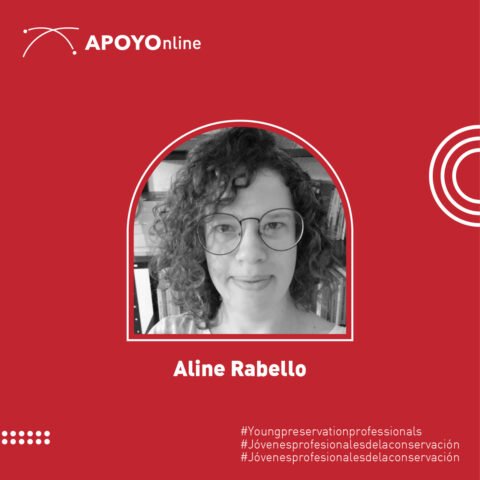This month in the #Youngpreservationprofessionals column we have the testimony of Brazilian Aline Rabello, a conservator-restorer with a bachelor’s degree from the Federal University of Minas Gerais!

During my first bachelor’s degree, in History, I was an intern at two heritage safeguard institutions that took me to the world of heritage education and collection preservation. After my undergraduate degree, I looked for a specialization that could add more knowledge to my experiences, but the job opportunities that were being created at the time always demanded a more specific knowledge in conservation-restoration methodologies.
So, I decided to return to the university and study my second bachelor’s degree, in Conservation-Restoration of Cultural Heritage at UFMG. I entered already focused on the paths that interested me: paper and preventive conservation. I graduated four years later, with several experiences under my belt and was awarded a scientific initiation scholarship. Choosing to do another bachelor’s degree when the expectation is already to be inserted in the job market is not an easy path. While I studied, classes were offered in the mornings and afternoons and finding an internship or job that accepted the need to have flexible schedules was like finding a needle in a haystack. But as we take our place in institutions and show the specifics of our knowledge, we can open space to justify the particularities of our training and the importance of integrating formal learning and practical experience.
I finished my undergraduate degree at the end of 2015, and I chose to step away from the academic path and return to the job market. I tried opening my own conservation studio, I learned how to make a website and manage promotional pages on social media; I put up “BOOK RESTORATION SERVICES” posters at universities, libraries, and wherever else I could advertise. Gradually – and this delay in returning, in professional recognition is very distressing, after all, the desire for financial independence is king at this time – I was getting a job here and there, and then they became regular. Learning to introduce myself, to publicize, to make budgets, to value my own dedication were challenges encountered at the beginning of the work.
At that time, I worked in other activities in parallel, and I don’t consider this a demerit, but my goal was to stay in the field and that’s why I always tried to keep one foot in conservation-restoration. Today I consider that having kept in touch with colleagues and professors, seeking to know about projects and funding notices were ways that helped me to stay in the field, even when everything seemed to go against it.
In 2017 I was called to join the team of the Management Board of Museum Collections of the Superintendence of Museums and Visual Arts, an extinct body of the Secretary of Culture of the state of Minas Gerais. Two years later I was selected to work in the Conservation and Restoration Section of the Documentation and Information Center of the Brazilian Congress, in Brasília, where I still work today as a contractor.
Each of these experiences brought me new friends, many joys and many other challenges. I tell you about this whole trajectory with the aim of showing how conservation-restoration is not just a 60-hour job. It is a huge field of knowledge that needs a lot of study and dedication. I am currently a member of ICOM, an associate of ABER and ANPUH. Participating in associations that represent my professional aspirations and, in the case of conservation-restoration, fight for ethical and legal action in favor of heritage preservation, are fundamental to achieving professional recognition and appreciation of our field of work, so broad and at the same time full of specifics.
In addition, I follow the discussions of the Commission for the Regulation of the profession, which seeks to mobilize society in favor of the approval of bill 1183/2019. I invite you to search for the PL and find out about the discussions. Get involved! For the preservation of our heritage, our memory, and our history! And for the professional recognition of conservators-restorers.


